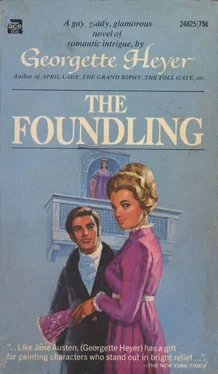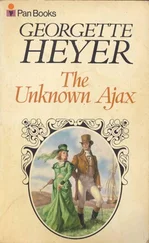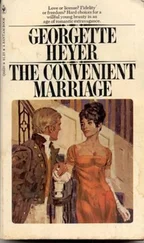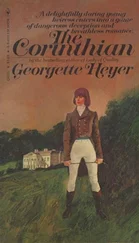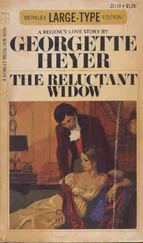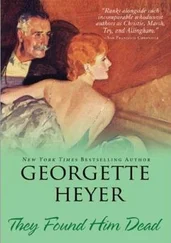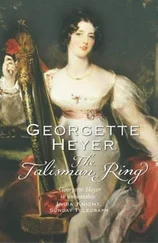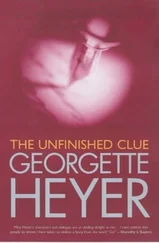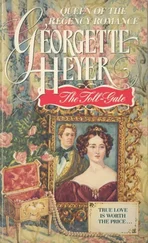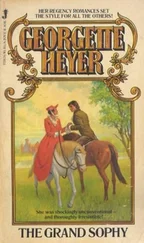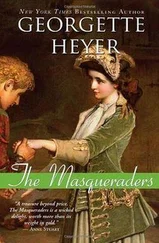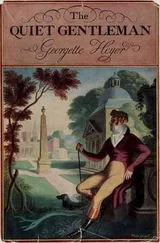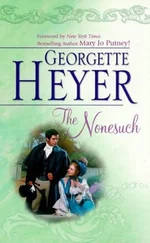As he walked down the gallery, he smiled at her, and enquired after the headache she had complained of earlier in the day. While she blushed, thanked, and disclaimed, Lord Lionel crushingly remarked that he did not know why people should have headaches, since he himself had never suffered such an ill in his life; and Mr. Romsey pleased nobody by saying: “Ah, my lord Duke has a fellow-feeling, I daresay! I am sure no one has suffered more from an affliction we more hardy mortals are exempt from!”
“Stuff and nonsense!” said Lord Lionel, who very much disliked to have his nephew’s delicacy of constitution mentioned by anyone other than himself.
Mr. Romsey’s well-meaning if unfortunate remark had the effect of arousing Lady Lionel from her customary lethargy, and she began to enumerate, with a surprising degree of animation, all the more shocking headaches her nephew had endured during his sickly boyhood. The Duke bore this patiently, but Lord Lionel pshawed and fidgeted, and finally broke in on a discourse that threatened to be never-ending, saying crossly: “Very well, very well, ma’am, but this is all forgotten now, and we do not wish to be reminding Gilly of it! Were you hedgerow-shooting, my boy? Had you any sport?”
“Three brace of partridges only, and some wood-pigeons, sir,” responded the Duke.
“Very well indeed,” said his uncle approvingly. “I have frequently observed that for all it may not be real game, as we understand it, the wood-pigeon gives some of the hardest shots of all. What shot did you use?”
“Seven,” said the Duke.
This made Lord Lionel shake his head a little, and point out the advantages of a four or a five. His nephew, having listened politely, said that he would grant him an accidental shot at long distance with his heavier shot, but that a well-breeched and properly bored gun would shoot Number Seven better than any other. As the Duke was a very pretty shot, Lord Lionel allowed this to pass with no more than a glancing reference to newfangled fads, and asked him if he had taken one of his Purdeys out.
“No, a Manton,” said the Duke. “I have been trying Joseph Manton’s New Patent Shot.”
“I have bought my shot from Walker and Maltby any time these thirty years,” declared his lordship. “But the old ways will never do for you young men! I suppose you will tell me this New Patent has some particular virtue!”
“I think the shot is more compact, and it is certainly cleaner to handle,” replied the Duke.
“I hope, Gilly, that you did not get your feet wet?” said Lady Lionel. “You know, if you were to take a chill it will go straight to your throat, and I was thinking only the other day that I cannot recall the name of that very obliging physician who recommended electricity. You were only a child, so I daresay you might not remember, but it was very excellent, though your uncle disliked it very much.”
“Does Borrowdale not know that you are ready for dinner?” demanded Lord Lionel loudly. “It will be six o’clock before we sit down to it!”
“There was quite a fashion for electricity at that time,” pursued his wife placidly. “I am sure I know of a dozen persons who took the treatment.”
“It was what the Captain calls all the crack,” said Miss Scamblesby, prefixing her remark with the titter which never failed to irritate his lordship.
Lord Lionel was both fond and proud of his son, but he did not propose to submit to having his words quoted to him, and he immediately said that he had the greatest dislike of cant expressions. Miss Scamblesby’s subsequent confusion was only relieved by the entrance of Borrowdale, who came in at that moment to announce that dinner was served. The Duke then assisted his aunt to rise from the sofa, Miss Scamblesby draped a Paisley shawl round her shoulders, Mr. Romsey handed her her fan and her reticule, and the whole party filed out into the hall, and across it to the dining-saloon.
Here the Duke took his place at the head of the table, in an immense carved oak chair, and Lord Lionel installed himself in a similar chair at the foot. Lady Lionel sat at her nephew’s right hand, and Miss Scamblesby and Mr. Romsey established themselves opposite to her, with only one footman between the pair of them.
Lord Lionel being an advocate of what he considered a neat, plain dinner, only two courses were served at Sale Park when the family dined alone. The first of these consisted of a tureen of turtle, removed with fish, which was in its turn removed with a haunch of venison. Several side-dishes, such as pork cutlets with Rober sauce, larded fillets of beef, tenderones of veal and truffles, and a braised ham, graced the board, but since his lordship was a moderate trencherman, and the Duke had a notoriously small appetite, the only person who did justice to the spread was Miss Scamblesby, who had (so his lordship had more than once remarked to his nephew) the inordinate appetite of all poor relations.
While the first course dragged on its way, conversation was of a desultory nature. The Duke looked tired; his aunt rarely troubled herself to make conversation; and Lord Lionel seemed preoccupied. When the first course was carried out in procession, however, he roused himself to say: “Well! You are all very dull to-night!” a remark which not unnaturally bereft the assembled company of any conversational ideas they might have had.
“Well, Gilly!” said his lordship, after a pause of which no one showed any sign of wishing to take advantage. “Have you nothing to say for yourself?”
A slightly apprehensive look came into the Duke’s eyes. Mr. Romsey said kindly: “I fancy you are tired, my lord.”
“No, no!” Gilly disclaimed, almost shrinking from the imputation.
It had the effect of softening Lord Lionel. “Tired? I am sure I do not know why you must all be for ever supposing him knocked up by the least exertion! Let me tell you, it is very irksome to a young man to have such nonsense talked of him! You are bored, Gilly! Yes, yes, you need not trouble to deny it, for I do not wonder at it! You should have invited some few of your Oxford friends to come down and shoot with you. It is dull work for you here alone.”
“Thank you, I am very happy, sir!” Gilly stammered. “You—I mean, we have invited several parties for the pheasant-shooting, I believe.”
“Well, well, that is looking some way ahead!” said his lordship indulgently. “You will scarcely wish for any large shooting parties until November!”
The second course here made its appearance, and a fresh array of silver dishes was set out. Some pigeons and a hare constituted the main features, but there were besides a quantity of vegetables, and several creams, jellies, and cakes, including, as Miss Scamblesby was quick to perceive, a Gateau Mellifleur, to which she was extremely partial.
Lady Lionel helped herself from a dish of artichoke bottoms in sauce. “I have been thinking,” she said. “If you should care for it, Gilly, we could get up a rubber of whist after dinner. I daresay we might prevail upon our good Mr. Romsey to take a hand, and if he does not care to, Amelia does not play so very ill.”
Her husband set his wineglass down rather hurriedly, and said with more haste than civility that she must know that Gilly disliked whist. Then, perceiving quadrille in her eye, he added: “Or any other game of cards. Besides, I have just recollected that Chigwell brought up the mails from the receiving-office this afternoon, and there is a letter for you from your Uncle Henry, Gilly. I will give it to you after dinner.”
The Duke’s entertainment having been thus provided for, Lady Lionel was able to relapse into indolence, merely wondering in an idle fashion what Lord Henry could be writing to Gilly about. Miss Scamblesby said that it seemed a long time since they had had the felicity of seeing dear Lord and Lady Henry Ware at Sale; and Mr. Romsey asked if Mr. Matthew was not now a freshman up at Oxford.
Читать дальше
